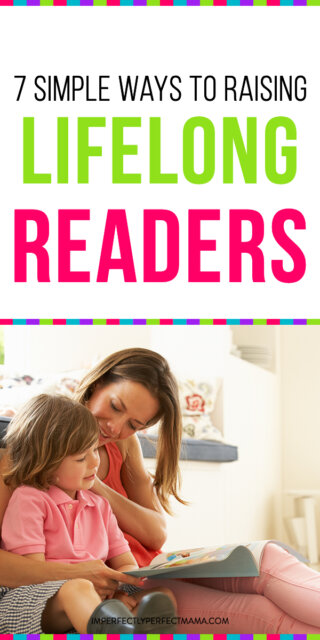You’ve seen those kids before:

Nose in a book while walking home from the bus stop.
Or little fingers clutching a bunch of shark books at the bookstore because they have a new favorite animal.
Or the child who keeps their current read always handy so that any downtime can be filled with the current adventure in between the pages.
These children are lifelong readers. But what exactly does it take to be a lifelong reader?
What Are the Characteristics of a Lifelong Reader?
Lifelong readers find joy and excitement in reading.
They use reading to learn more about that dolphin they saw on their beach vacation or to bake their great-grandmother’s chocolate chip cookies for their children for the first time.
These readers see the value in reading and want to share in their knowledge with others.
Find Time to Read for Multiple Purposes
Lifelong readers will find time to read even during a busy day. Many times these readers will escape in a book after a stressful day or will read the news to keep up on current events.
Reading is a continuous part of a lifelong reader’s day. To grow into a lifelong reader, you’ll want your child to view reading as a daily, enjoyable habit.
Your child should be excited to get some down time to read so that they can jump right back into the journey their books are leading them on.
Enjoy Choosing Their Own Books to Read
Lifelong readers enjoy picking out the books they get to read. They get excited about their next book and can’t wait to dive in.
Choice is key. When reading something that they actually want to read and are interested in, they are able to attend more to the text, and in turn, increase their comprehension.
When your child is growing into a lifelong reader, they will love going to the bookstore or the library to pick out new books to read. Their next adventure waits in the pages of a book.
Share Their Reading With Others
Lifelong readers love to share about what they are reading with their friends or community of readers.
Think about a time when you were reading a book you couldn’t put down. I’m sure you were recommending it as the perfect beach read for all of your friends.
This habit of a lifelong reader builds friendship and community. Getting to share about things they enjoy help support children in establishing their self-worth and identity.
Why Should You Care About Nurturing a Lifelong Reader?
You always hear just how important reading is.
But why, exactly?
Vocabulary
Reading builds vocabulary. Plain and simple. Every time your child picks up a book, whether they are a toddler or in grade school, they are exposing themselves to new words.
There are more higher level vocabulary words in texts than in conversation alone. The words we use in conversations with others are more simple and used to get our points across.
In literature, there could be more complex words describing a character’s personality.
Or, informational texts could be using content-specific vocabulary, which is just words that are specific to a topic. An example might be that some dinosaurs are carnivores or birds are oviparous animals.
Therefore, any time that any text is read, your child will acquire new words in context and have to use critical thinking skills to determine their meaning, promoting a higher rate of remembering those words and using them in the future.
Comprehension
Comprehension and vocabulary are very closely linked. Think about it…the more words that you know and understand as you are reading, the better you will comprehend a text as a whole.
So reading more increases your child’s vocabulary, which increases comprehension.
The Young Readers Foundation discusses the importance of comprehension in young children. When children start reading at a young age, they have better comprehension, which relates to their intelligence and how they understand situations and the world around them.
Life Skills
In addition to academics, children can also learn a lot about life skills through reading.
Children’s books tend to have relatable characters that children can understand. A character may experience a problem that a child could experience.
These story-lines with lovable characters can teach empathy and perseverance to young children. Young readers may look to how a character solved a problem to try to figure out how to solve a problem of their own.
7 Strategies for Raising a Lifelong Reader

So how can you nurture a lifelong reader?
Here are 7 strategies that will get your child eager to pick up book after book.
1. Start Young
It is never too early to start reading to your child. From day one, despite your exhaustion, you could pick up a book and get your snuggles on.
The benefits of reading aloud to your child start early on as they are absorbing and making sense of the world around them.
In those early stages, hearing your voice is a way to strengthen the bond and attachment between you and your child, creating a sense of security in their surroundings.
When children feel safe, they are more able to focus their attention and open up to learning.
Why not start in the womb? We know your child can hear your voice in utero. Just like they can recognize familiar songs from their time in the womb, they might even be able to recognize a familiar book.
So start your bonding and attachment building as early as you can.
2. Create a Sacred Read Aloud Time Every Day
You have probably read countless articles about how important it is to read aloud to your child every day.
One way to ensure that you can get that read aloud time every day is to make it a sacred part of your routine. Protect it and make certain that the time remains a special time for you and your family.
Whether it is a special time in the morning or part of your child’s bedtime routine, make your read aloud time a priority.
As your child grows older, you can still nurture this time as a time to read. It may not be a read aloud, but continue your tradition by having “family reading time” where everyone chooses something to read for enjoyment.
Keeping reading enjoyable and part of your family’s traditions is key to creating a lifelong reader.
3. Develop Your Child’s Reading Identity
As your child grows, you may notice that they start to have preferences for certain types of books. Be mindful of these preferences and nurture them by allowing your child to delight in their favorites.
Lifelong readers can read for a variety of purposes, but they also know what they enjoy reading the most. They understand what types of texts to seek out for the different purposes they read for.
When your child is in school, it is important for them to gain an understanding of their identities so that they can set meaningful goals for themselves as they grow into being a reader.
Sometimes they may have to read a text that isn’t in the realm of their identity, but it is through their identity and the goals that they set as a reader that they can persevere through things they may not like…and come out stronger on the other side.
4. Be a Role Model
Your child watches everything you do and wants to do things like you so they can be like you. The best thing you can do to foster a lifelong reader is to show your child how you are a lifelong reader.
Make your reading visible by reading the newspaper, magazines, favorite books, recipes, and more in front of your child.
When they see that reading is such a fulfilling part of your life, they will want to be readers themselves.
5. Create a Literacy-Rich Environment
Another way to support a lifelong reader is to create a literacy-rich environment at home. This could mean anything from keeping children’s books visible and accessible to having magnetic letters at the ready for play.
Surrounding your child in an environment full of literacy opportunities supports their growth as a reader.
When they see that their family values books and reading, it becomes part of their self-identity too.
6. Nurture Your Child’s Curiosity Through Reading
Curiosity is a wonderful virtue that children have. They want to learn how the world around them works.
Instead of always just answering their questions, show them how they can find their answers through reading.
Maybe it’s a trip to the library or something as simple as a Google search. Whatever it is, encourage your child to use reading as a way to answer their most interesting questions.
With you as a guide on their side, they will surely continue to be inquisitive and know how to using texts to their advantage, as lifelong readers do.
7. Make Reading and Learning Fun
Of course, when children are always being told what to read and are doing things with literacy that feel like a chore, they are more likely to not want anything to do with reading.
Choice is a powerful thing when it comes to reading. It can make your child feel empowered and confident.
Although they may have assignments when certain unattractive reading is required, you should always be trying to make reading and learning fun. You can do this by ensuring that they get to still read for enjoyment.
Making a game out of mundane phonics homework or bringing life to a book they don’t want to read can all help your child persevere through tasks they don’t want to complete, just as lifelong readers do.
What’s Next for Your Lifelong Reader?
So there you have it: 7 simple and effective tips to help nurture your lifelong reader.
But you may be wondering what is next for your little learner.
The key to the lasting effects of creating a lifelong reader is pretty simple: be your child’s cheerleader and number one supporter.
Capitalize on their strengths and lovingly support their weaknesses. You can open up a world of possibilities for them.
Let them explore. Let them learn. Let them be kids.




2 Comments